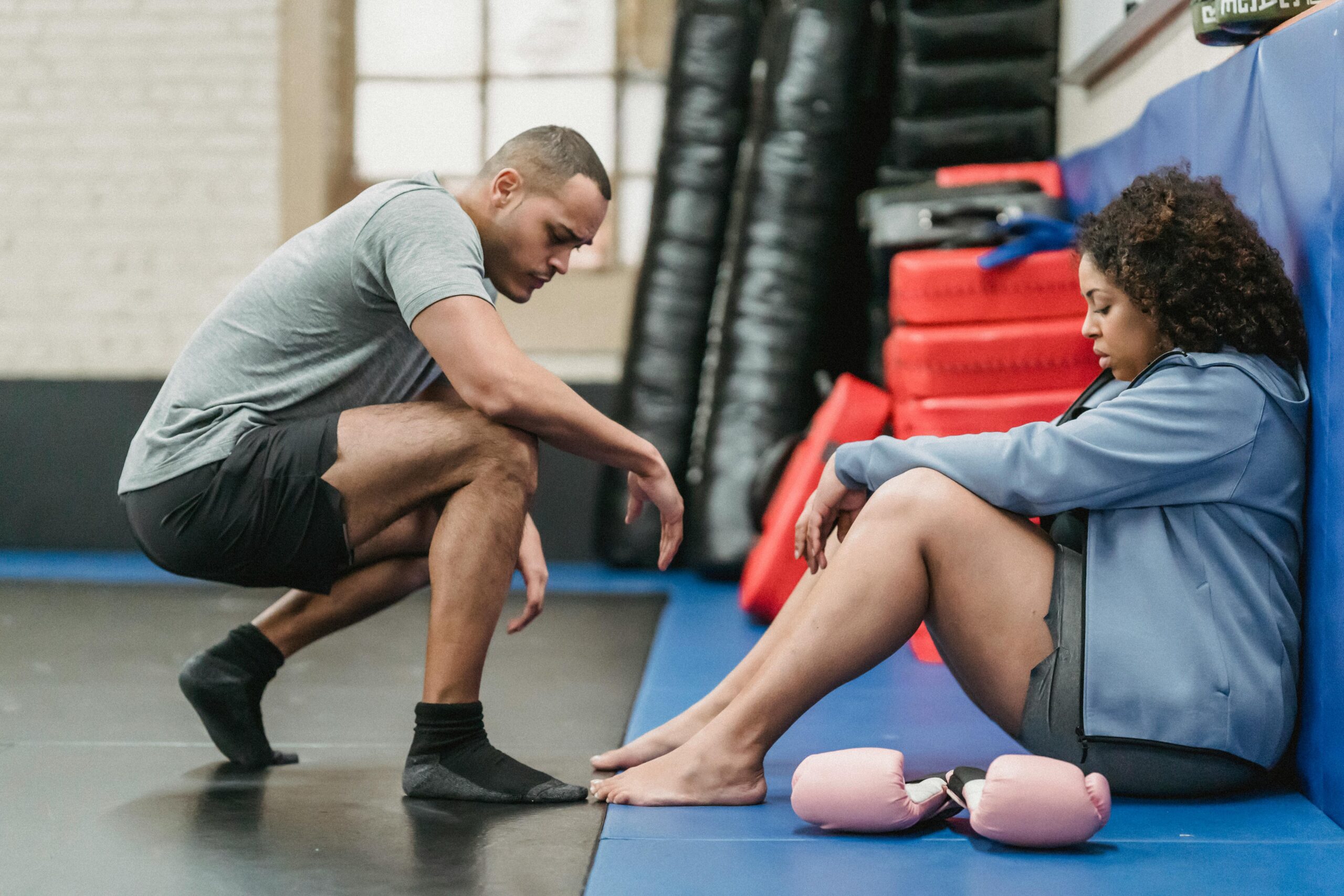Do you feel like every day is a bad day, exhausting, as if it’s an uphill battle? Struggling to stay motivated, constantly tired, and noticing that your performance is slipping, no matter how hard you try? These could be signs that you may be having some symptoms of exercise burnout.
Burnout is often associated with work, but it can also seep into other areas of your life. Even the most dedicated gym-goers aren’t immune to it, turning workouts from a source of joy into a draining chore and leaving them feeling worn out both inside and outside.
If you’re working out regularly but feeling constantly drained, irritable, or unmotivated, it’s worth paying attention. Ignoring those warning signs can lead to bigger, real health consequences over time, like hormonal imbalances, chronic injuries, and mental health struggles.
What is Exercise Burnout?
Burnout is commonly defined as “physical or mental exhaustion and a reduced sense of accomplishment.” It can pose a real threat to your long-term fitness journey, making it harder to enjoy or stick with physical activity, even when you know it is good for you.
It usually sets in when you’re overwhelmed, emotionally and mentally drained, and unable to meet constant demands.
Exercise burnout (also known as fitness burnout or workout burnout) happens when you exercise for too long, coupled with high-intensity routines, without having adequate rest and recovery time. It’s not just overtraining and inadequate rest—boredom, poor nutrition before and after workouts, and unrealistic fitness goals can also contribute.
Understanding what causes this kind of exhaustion is key to preventing it and making sure your workouts stay something you enjoy rather than something you dread.
I’ve experienced workout burnout firsthand, the kind where even putting on gym clothes feels like a chore. What helped me most was learning to listen to my body instead of just pushing through. It’s easy to think that more effort equals more progress, but sometimes, rest is the real breakthrough.
What are the Causes of Workout Burnout?
Exercise is beneficial for both your body and overall health. It improves your strength, endurance, and flexibility, allowing you to perform daily activities with greater ease. Regular physical activity strengthens heart and lung function, promoting cardiovascular health and better circulation. It also releases endorphins, which help you get moving to manage stress.
But when taken too far, even something as healthy as exercise can backfire. Overtraining, lack of rest, and mental fatigue can all lead to burnout. Here are a few specific causes of workout burnout to watch out for:
- Pushing yourself too hard
- Insufficient recovery time
- Poor nutrition and hydration
- Monotonous workouts
- Unrealistic goals
- Not doing the exercise that you enjoy
- Lack of social support
What are the Symptoms of Exercise Burnout?
Burnout doesn’t happen overnight; it’s a gradual process. It develops slowly from constant physical exhaustion, lack of recovery, mental stress, and pushing yourself beyond healthy limits. It not only affects your body physically, but your mind and emotions also take a toll; when you feel the symptoms of exercise burnout can impact your overall health.
If you assume that feeling tired after working out is just part of pushing yourself harder and striving for more goals, think again. Pushing too hard for too long can backfire,
It’s essential to recognize when you’ve crossed the line into burnout. Identifying the signs early can help you protect your health, prevent injuries, and continue exercising safely and sustainably.
-
Soreness And Exhaustion
After your workout, you might feel sore and tired; that’s normal. But if getting out of bed feels like a workout itself, or your arms ache just from reaching for your phone, and that fatigue lingers throughout the day even when you’ve skipped the gym, that’s a red flag. Persistent soreness and exhaustion may be signs of overtraining.
I’ve had mornings where I’d lie in bed debating whether it was even worth moving. I thought being sore all the time meant I was making progress, but I was actually ignoring signs that I needed to rest.
Remedy: Take a rest day or two, or three. Recovery improves muscle fatigue. Try light stretching, foam rolling, staying hydrated, and getting enough sleep.
-
Unintended Weight Changes
Normally, working out helps regulate appetite. But when you push yourself too far, your body can respond with hormonal imbalances. Stress hormones like cortisol affect how hungry or full you feel, which can lead to decreased appetite, unintentional weight loss, or even weight gain.
Remedy: Maintain a balanced diet and support it with hydration, especially during exercise. If stress has disrupted your eating patterns, reintroduce structure gradually. Set reminders to eat, skip the sweets, and focus on whole foods like fruits and veggies to support both mood and energy.
-
Mental Exhaustion or Loss of Motivation
If the treadmill feels longer, the weights feel heavier, you catch yourself staring into space between sets, forgetting how many reps you’ve done, and you’d rather sleep in and skip the gym. It’s a sign that you’re mentally exhausted and have lost motivation for working out. Even simple decisions can suddenly feel overwhelming and frustrating, such as choosing which exercise to start with.
I remember walking into the gym and just standing there, feeling completely blank. I didn’t know where to start, and the idea of lifting anything felt heavier than usual, not just physically, but mentally.
Remedy: Occasionally, it’s good to step outside your comfort zone and try new things to bring back the excitement you feel when working out. Try a new activity like Pilates, boxing, or even a dance class. Exploring different forms of movement can re-energize your routine, boost your mood, and avoid symptoms of exercise burnout.
-
Mood Swings
Working out is supposed to be a way to relieve stress, but when you’re burned out, it can start having the opposite effect. If you workout to help you heal mentally and emotionally, it can be upsetting if it doesn’t do the trick. Small things can easily get under your skin, such as someone hogging the dumbbells or the treadmill squeaking loudly. You might feel like you’re going back and forth between being irritated and frustrated because your workouts aren’t making you feel the same.
Remedy: Prioritize self-care and emotional reset. Treat yourself to a massage, quiet downtime, or explore stress meditation to help regulate your mood and get back in sync with yourself.
-
Social Withdrawal
Social connection is a big part of wellness. But when you’re burned out, spending time with workout buddies may suddenly feel draining instead of energizing. You try to come up with excuses not to join your friends at the gym, ultimately leading to skipping the gym. This lack of social support is a recognized contributor to athlete burnout, particularly among high-achieving individuals or those with competitive personalities.
There was a time when I’d make up excuses just to skip group workouts. Not because I didn’t like the people, but because I just couldn’t handle being around anyone. Everything felt too much.
Remedy: Give yourself permission to rest, but avoid total isolation. Instead of hitting the gym, grab coffee with a friend or join a casual group class. Integrating social interaction into your fitness routine can make exercise feel like a task, but it can also make it feel more like a team effort.
How to Avoid Symptoms of Exercise Burnout
Working out should boost your energy, not drain it. If you want to prevent burnout, take advantage of these tips:
1. Prioritize Rest and Recovery.
Be mindful of how often and how intensely you train. Recovery is when your body actually gets stronger, not during the workout itself.
- Take 1 to 2 days off after targeting a muscle group with weight or resistance training.
- Allow 30 seconds to 5 minutes of rest between sets, depending on the intensity.
- Include active recovery workouts like walking, swimming, or yoga to give your body a break without losing momentum.
- Aim for 7 to 9 hours of quality sleep per night to help your muscles and mind fully recharge.
2. Change Up Your Routine.
Boredom is a sneaky contributor to burnout. Repeating the same workouts week after week can feel mentally dull and physically draining. To keep things interesting and enjoyable, try new activities, whether it’s a group class, a sport, or a different training split.
3. Eat Well and Stay Hydrated
What you eat (and drink) directly affects your energy, recovery, and performance. Choose foods that support your body through every stage of training.
- Oranges and carrots for immune-boosting antioxidants
- Oats and quinoa for high fiber and slow-digesting carbohydrates
- Nuts and legumes for protein and fiber
- Salmon and tuna for omega-3 to reduce inflammation
- Low-fat dairy for added calcium and protein
And don’t forget hydration, avoiding common hydration mistakes can make a big difference in how well your body performs and recovers.
4. Engage in Self-Care
You train hard, so don’t forget to rest hard too. Prioritizing rest isn’t laziness; it’s part of the process to avoid symptoms of exercise burnout. Build moments of relaxation into your week so your body and mind can reset.
- Take a 20 to 30-minute power nap (or a longer 60 to 90-minute one when needed)
- Book a spa massage to relieve tension
- Enjoy a warm soak in a tub or hot tub to relax tight muscles and calm the nervous system
Final Thought
Exercise provides remarkable benefits that significantly enhance nearly every aspect of your health. But if you’re overtraining, persistently pushing yourself too hard, or ignoring the signs your body is sending you, you may end up feeling more exhausted and dreadful than energized and empowered.
That’s why it’s important to train smarter, not just harder. Rest is not a setback; it’s part of the process. Giving your body and mind enough time to recover doesn’t just prevent injury or fatigue; it actually helps you become stronger, feel better, and stay consistent in the long term.
Listen to how your body responds. Respect your limits. And don’t be afraid to slow down if that’s what you need. The goal is to build a lifestyle you can sustain, not just survive.
Frequently Asked Questions
Commonly asked questions about symptoms of exercise burnout.


